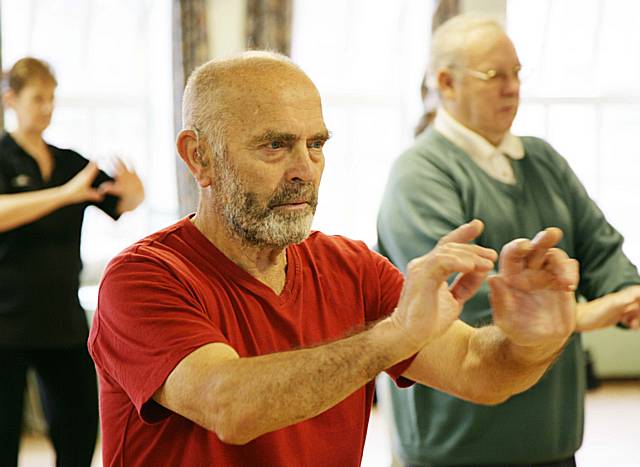Tai chi as good as or better than aerobic exercise for managing chronic pain
Date published: 22 March 2018

Tai chi as good as or better than aerobic exercise for managing chronic pain
The ancient martial art of tai chi has similar or greater benefits than aerobic exercise for people with the chronic pain condition fibromyalgia, finds a trial published by The BMJ.
The findings suggest it may be time to rethink what type of exercise is most effective for patients with chronic pain conditions.
Fibromyalgia is a long-term condition that causes widespread body pain. It may also lead to extreme tiredness, muscle stiffness, difficulty sleeping and depression. It affects around 2-4% of the adult population worldwide.
Aerobic exercise is currently recommended as a standard treatment, but many patients find it difficult to exercise due to fluctuations in symptoms. Some trials have suggested that tai chi alleviates pain and improves physical and mental health in patients with fibromyalgia but concluded that larger and more rigorous trials are needed to confirm the results.
So to investigate further, a team of US researchers set out to compare the effectiveness of tai chi with aerobic exercise and to test whether this depends on its frequency or duration.
They identified 226 adults with fibromyalgia who had not participated in tai chi or other similar types of complementary and alternative medicine within the past six months. The average age of participants was 52 years, 92% were women, 61% were white, and average duration of body pain was nine years.
At the start of the trial, participants completed the fibromyalgia impact questionnaire (FIQR), which scores physical and psychological symptoms such as pain intensity, physical function, fatigue, depression, anxiety, and overall wellbeing.
Participants were then randomly assigned to either supervised aerobic exercise twice weekly for 24 weeks or to one of four tai chi interventions: 12 or 24 weeks of supervised tai chi completed once or twice weekly.
Changes in symptom scores were assessed at 12, 24 and 52 weeks and participants were able to continue routine drugs and usual visits to their physicians throughout the trial.
FIQR scores improved in all five treatment groups at each assessment, but the combined tai chi groups improved significantly more than the aerobic exercise group at 24 weeks. Tai chi also showed greater benefit when compared with aerobic exercise of the same intensity and duration (twice weekly for 24 weeks).
Those who received tai chi for 24 weeks showed greater improvements than those who received it for 12 weeks, but there was no significant increase in benefit for those who received tai chi twice weekly compared with once weekly.
The effects of tai chi were consistent across all instructors and no serious adverse events related to the interventions were reported. The findings also remained largely unchanged after further analyses to test the strength of the results.
The researchers point to several study limitations. For example, participants were aware of their treatment group assignment, and attendance differed between the two treatment groups, both of which could have influenced the results. However, key strengths include the large and diverse sample and longer follow-up than previous studies.
The conclude: “Tai chi mind-body treatment results in similar or greater improvement in symptoms than aerobic exercise, the current most commonly prescribed non-drug treatment, for a variety of outcomes for patients with fibromyalgia.
“This mind-body approach may be considered a therapeutic option in the multidisciplinary management of fibromyalgia.”
In a linked opinion article, lead researcher Dr Chenchen Wang, says the public health problem of chronic pain calls for an “all hands on deck” approach to give patients feasible therapeutic options for the management of fibromyalgia. He said: “It is time, therefore, for physicians to explore new approaches and rethink their strategies in order to provide the best care for patients with chronic pain conditions.”
Do you have a story for us?
Let us know by emailing news@rochdaleonline.co.uk
All contact will be treated in confidence.
Most Viewed News Stories
- 1Royton haulage firm fined after Rochdale dad went to work and didn’t come home
- 2Six men arrested in Rochdale child exploitation investigation
- 3Rochdale church to host Camerados public living room
- 4Suspended council candidate was ‘politically naive’ for appearing in George Galloway video, leader...
- 530 years of the GEM Appeal, a Rochdale-founded charity that has raised millions and changed the...
To contact the Rochdale Online news desk, email news@rochdaleonline.co.uk or visit our news submission page.
To get the latest news on your desktop or mobile, follow Rochdale Online on Twitter and Facebook.


